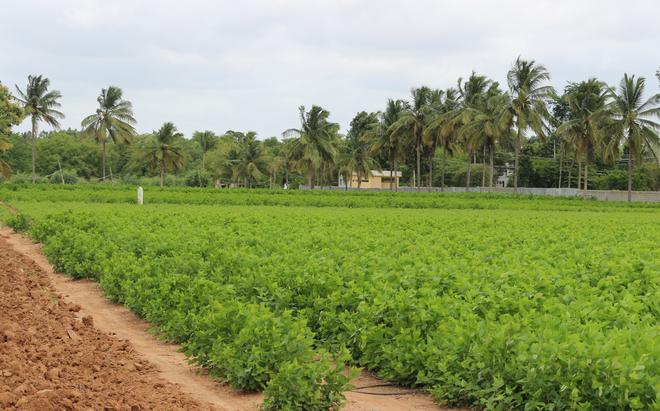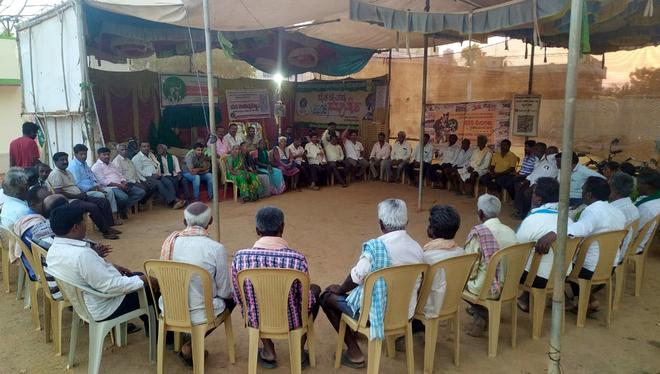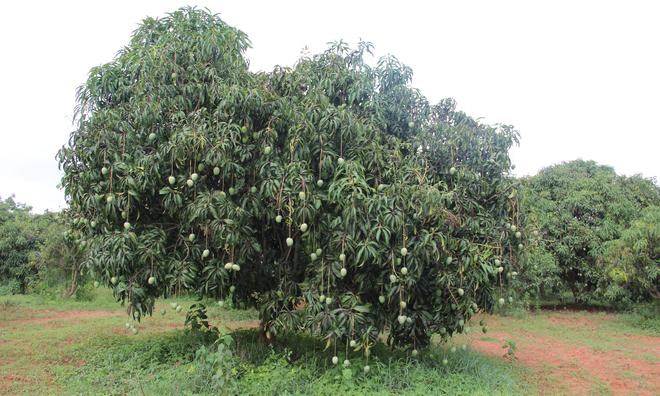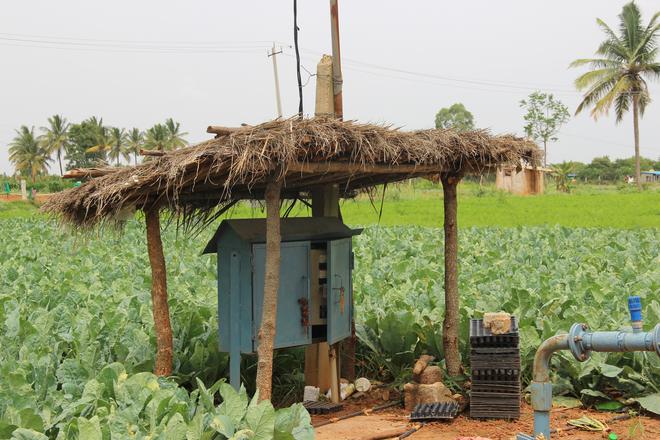It is a simmering summer afternoon in April. A group of farmers are sitting under a temporary shelter at Channarayapatna in Devanahalli taluk, on the outskirts of Bengaluru. Rain or shine, this group from 13 villages has been on an indefinite dharna (protest) to safeguard their agricultural land, which is set for acquisition for an industrial project. The farmers are resisting the acquisition. The dharna commenced on April 4, 2022, and has now completed 460 days.
The Karnataka Industrial Area Development Board (KIADB) is set to acquire 1,777 acres for the Haralur Industrial Area Development Project (Phase II). In Phase 1, the board developed an industrial area spread over 1,282 acres, where two companies have set up production units. The preliminary notification for the acquisition was issued on August 30, 2021. The final notification is yet to be issued.
The villages where land has been notified for acquisition are Palya, Haraluru, Polanahalli, Gokare Bacchenahalli, Nallur, Mallepura, Nallappanahalli, Cheemachanahalli, Mattabaralu, Muddenahalli, Channarayapatna, S. Tellohalli and Hyadala. About 700 farmers’ families will be affected by this project. Up to 475 acres are owned by farmers belonging to Scheduled Castes and Scheduled Tribes. Agriculture has created employment for about 6,000 labourers in the area.

Though farmers have been protesting for over two years, the issue came back into prominence when they decided to boycott the Lok Sabha elections on April 26 in 14 constituencies in south Karnataka. Several politicians, including Ministers and candidates, tried to meet the farmers to cajole them to cast their votes. Following promises of resolving the problem, the farmers eventually cast their votes but have continued their protest. They plan to continue until their demand is met.
For Ramesh Cheemachanahalli, sitting at the dharna site, the protest is now a routine part of his life that otherwise revolves around agriculture. Like him, every day, at least 35 farmers sit at Channarayapatna under a tent. On certain days, more than 500 gather at the site. For instance, when Rakesh Tikait of the Bharatiya Kisan Union visited them on September 6, 2023, more than 1,000 farmers turned up at the protest site.
“Our family has been living in Cheemachanahalli for several generations. For us, land is an emotional issue. The KIADB has notified 7 acres of land of our family for acquisition. We grow grapes, ragi, avarekai (beans) and manage fodder for cattle. Parting with the land simply means the end of cultivation. For nearly 1,292.1 acres, land-owners have filed an objection against acquisition pointing out that the land is part of a thick agriculture belt that yields food and horticultural crops, and is used for dairy farming,” said Ramesh.
“I have been eating food grown on our land, and the family considers the land as our mother. For people here, losing land is no less than losing their mother,” he said. The notified land includes irrigated land, apart from rain-fed land. “During elections, politicians speak of working for the interests of farmers. After the polls, they disregard their promises. We are not anti-development. The government can acquire barren land elsewhere for the project,” he added.
Pramod, another farmer, said that although farmers have been protesting for more than 400 days, politicians visited them only during elections, fearing a boycott. Among other people, the farmers have met Minister for Commerce and Industries, and Infrastructure Development M.B. Patil.
Pramod said following the boycott call, Congress candidate in Chikkaballapur constituency M.S. Raksha Ramaiah and Minister for Food and Civil Supplies K.H. Muniyappa arrived at the protest site and promised to resolve the farmers’ issues after the elections.
Karalli Srinivas, who will lose land, asked why KIADB wants to set up industries on fertile land, which is a source of income for farmers. “Most of us here are small farmers, dependent on the land for livelihood. We want to continue farming; KIADB should drop the project. Our sit-in protest will not stop until the government relents,” Srinivas said.

Farmers conduct survey
Besides the dharna, farmers have conducted a survey of 1,292.1 acres of land, for which objections were filed with KIADB. The survey revealed that about 42% of the land was granted by the government to landless people and cultivators, while 58% is ancestral property. The data showed that 50% of the land is rain-fed, 33% is irrigated through borewells, and 17% is categorised as ‘others’.
Farmers are cultivating crops in both rain-fed and irrigated land. Ragi is grown in 49% of the total area; 7% of the land area has grapes and pomegranate cultivation; 23% has mango, tamarind, and cashew plantations; while vegetables and flowers are cultivated in 12% of the total area, the survey revealed.
According to this survey, about 1,000 tonnes of ragi and other foodgrains, 2,000 tonnes of grapes, 150 tonnes of mangoes, and other produce are grown on this land. Up to 8,000 litres of milk are produced every day in 13 villages, and dairy farming is a major source of income for farmers.

Meetings yield no results
Following objections to the acquisition, Patil met the farmers. In the first meeting, he sought time to examine the files to understand the problem, saying he had recently taken charge as Minister. In the second meeting, there was no promise of withdrawing the notification, as a small section of farmers expressed willingness to give land for the project.
Ramesh Cheemachanahalli claims that real estate agents and middlemen persuaded a few landowners to give up their land for the project. The meeting ended in an impasse. The KIADB is likely to call a third meeting after the Lok Sabha elections.
Mahesh M., Chief Executive Officer, KIADB, said that confusion among farmers has stalled the project. Otherwise, the final notification for acquisition would have been issued by this time. “This is the extension of the Devanahalli Industrial Area. The KIADB has completed the first phase, and industries are being set up. This is the ideal place for setting up industries,” he said. After the Lok Sabha elections, Karnataka Chief Minister Siddaramaiah will hold another round of deliberations with farmers to decide the fate of the project. He expressed confidence that farmers may eventually agree to part with their land.
An official in the KIADB claimed that most of the land is not actually cultivated, and farmers are not sharing the complete story. “There is a lot of barren land that is not irrigated and is dependent on rain. In these patches, people are not growing crops. Agriculture is not a major economic activity for them. They have other sources of income since these villages are close to Bengaluru city,” he said.

Role of realtors
The farmers allege that a few real estate agents are pushing for the project. Some such agents have even entered into sale deed agreements by paying an advance to the farmers, they allege. After the land is acquired, a portion of compensation money will be paid to clear the remaining payment. These agents are also manufacturing dissent among the farmers, and KIADB is aiding this, they feel.
Some agents act as middlemen between farmers and the KIADB. For compensation, the farmers have to furnish more than 20 documents. Many farmers do not have the knowledge to secure them from various departments. These agents have contacts in government departments and speedily procure the documents.
“The farmers have to pay a hefty commission after receiving compensation. For instance, if the compensation is ₹1 crore, the farmer has to pay nearly ₹30 lakh as commission to the agent. The earnings of farmers are drained by the blood-sucking agents,” claimed a farmer, who did not want to be identified.
Now, these agents are pursuing the KIADB not to drop the project, and it appears that the officials are yielding, said another farmer. “The KIADB should look at the plight of small land-holding farmers whose lives are dependent on agriculture,” said a farmer.
A KIADB official insisted that the board has no history of entertaining real estate agents and middlemen. The compensation is directly given to the landowner, and the board follows a fair process, he said. “Farmers should not listen to people who claim to be middlemen. After the polls end, Chief Minister Siddaramaiah will listen to land-owners who are opposing the project and take the final call. The KIADB has offered compensation either in terms of cash or in terms of land to those who will lose theirs. The board will always work according to the law, and the process is very fair,” claimed Mahesh.







